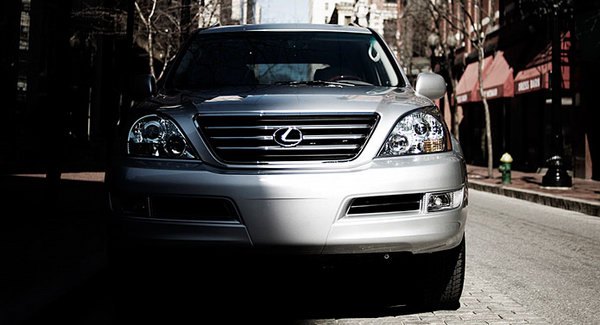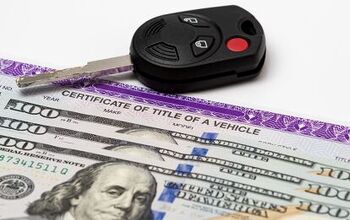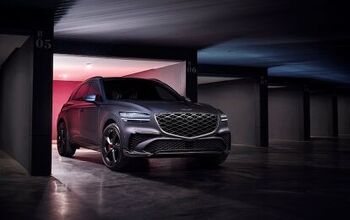Toyota Halts Lexus GX 460 Sales, Stock Drops

Toyota’s Lexus GX 460 has been taken behind the woodshed by consumer reports. The SUV re-emerged with two black eyes. CR issued a “Don’t Buy” rating and declared the GX 460 a “safety risk.” Said TTAC’s Edward Niedermeyer: “Expect GX460 sales to fall off a cliff until the model is fitted with an electronic straitjacket.” Fall off a cliff? Sales are zero as of this morning.
Toyota “suspended sales of the 2010 Lexus GX 460” reports Automotive News [sub]. Toyota will be “vigorously testing” the luxo-SUV until they will know what’s going on.
“At this time we have asked our dealers to temporarily suspend sales of the 2010 GX 460,” said Lexus Group Vice President Mark Templin. If you have a Lexus GX 460, and you are worried, then your friendly Lexus dealer will provide you with a loaner until the matter is resolved, said Toyota in a statement.
Citing the obvious, IHS Global Insight analyst Aaron Bragman said the matter “certainly does no favors for Toyota and adds doubts in people’s minds as to the safety and reliability of Toyota vehicles.”
For as long as one can remember, Consumer Reports had been under suspicion of being a Toyota fanzine. “Past endorsements from Consumer Reports have been credited as one reason for Toyota’s steady sales growth in the United States over the past 15 years,” says AN. That friendship seems to be over. Last time Consumer Reports had issued such a damning statement was in 2001, when CR told consumers to avoid the Mitsubishi Montero Limited. Mitsubishi never recovered.
The Nikkei [sub] reports from Tokyo that “shares in Toyota Motor Corp. continued lower Wednesday morning, after the automaker said Tuesday U.S. time it will suspend sales of the 2010 Lexus GX 460 SUV … Investors sold the stock on concern about a possible recall and the impact on earnings.”

Bertel Schmitt comes back to journalism after taking a 35 year break in advertising and marketing. He ran and owned advertising agencies in Duesseldorf, Germany, and New York City. Volkswagen A.G. was Bertel's most important corporate account. Schmitt's advertising and marketing career touched many corners of the industry with a special focus on automotive products and services. Since 2004, he lives in Japan and China with his wife <a href="http://www.tomokoandbertel.com"> Tomoko </a>. Bertel Schmitt is a founding board member of the <a href="http://www.offshoresuperseries.com"> Offshore Super Series </a>, an American offshore powerboat racing organization. He is co-owner of the racing team Typhoon.
More by Bertel Schmitt
Latest Car Reviews
Read moreLatest Product Reviews
Read moreRecent Comments
- V8fairy Not scared, but I would be reluctant to put my trust in it. The technology is just not quite there yet
- V8fairy Headlights that switch on/off with the ignition - similar to the requirement that Sweden has- lights must run any time the car is on.Definitely knobs and buttons, touchscreens should only be for navigation and phone mirroring and configuration of non essential items like stereo balance/ fade etc>Bagpipes for following too close.A following distance warning system - I'd be happy to see made mandatory. And bagpipes would be a good choice for this, so hard to put up with!ABS probably should be a mandatory requirementI personally would like to have blind spot monitoring, although should absolutely NOT be mandatory. Is there a blind spot monitoring kit that could be rerofitted to a 1980 Cadillac?
- IBx1 A manual transmission
- Bd2 All these inane posts (often referencing Hyundai, Kia) the past week are by "Anal" who has been using my handle, so just ignore them...
- 3-On-The-Tree I was disappointed that when I bought my 2002 Suzuki GSX1300R that the Europeans put a mandatory speed limiter on it from 197mph down to 186mph for the 2002 year U.S models.


































Comments
Join the conversation
NEWSFLASH: Initiating sudden and common emergency steering manuevers can cause your top-heavy, high-center-of-gravity non-sports car to possible topple. PERSONAL NOTE: After 160,000 miles, I still haven't flipped my Trooper.
This isn't a big seller anyway. The status crowd that wants an SUV seems to go for the RX (and the RXh if they think it's cool to be "green"). The ones with the real money go for the LX. I saw a few GX470s, but most of the new GX460s I think I see are LXs.